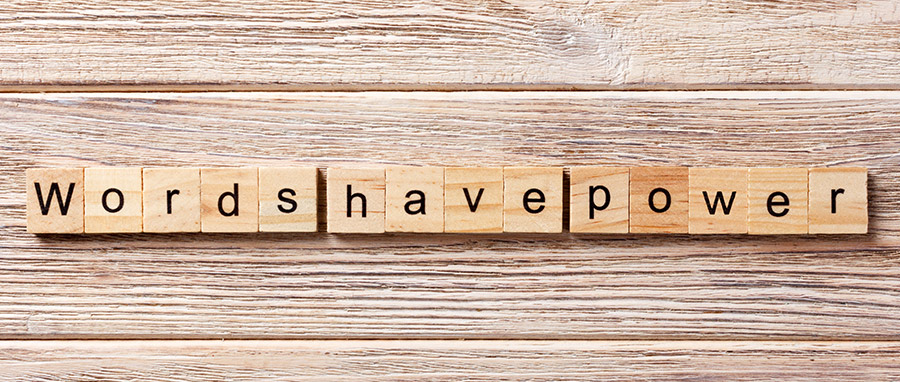The old adage, “sticks and stones may break my bones, but words will never hurt me,” is something that has been passed down through the generations. I’m sure you can remember hearing this as a child either from your parent or a fellow classmate. In adulthood, you probably have come to understand the depth of that statement. How words impact our lives has been debated between a variety of disciplines for almost as long as language has been around. From leaders in spirituality and moralistic philosophy to doctors in the field of psychology, the question has been, “do words have power and if so, what power do we as individuals have over the effects those words could possibly inflict?” Now, consider the impact of negative language to someone new in recovery and how that could affect their process…
Negative Language’s Impact on Brains and Ice Crystals:
Dr. Masaru Emoto conducted experiments on water stored in containers and then supercooled them to create ice crystals. During the experiment, researchers labeled some containers with negative words. Conversely, other bottles were labeled with words of gratitude. The findings in the Society for Scientific Exploration in 2008, Volume 22, Number 4 (2008). They found that negative language, words, or emotions can structurally influence the formation of ice crystallization, confirming that words have power. This suggests that if the impact of negative language can influence the structural makeup of water, then words can impact our lives and possibly affect us on a molecular level.
Now, other scholars have debated these findings; however, one thing that has been given merit is that words have power, maybe just not to the extent Dr. Emoto posits. Psychology Today reported, “if I were to put you into an fMRI scanner—a huge donut-shaped magnet that can take a video of the neural changes happening in your brain—and flash the word “NO” for less than one second, you’d see a sudden release of dozens of stress-producing hormones and neurotransmitters. These chemicals immediately interrupt the normal functioning of your brain, impairing logic, reason, language processing, and communication.”
Ready to move past negativity? Read How To Stay Positive.
Negative Language in Addiction Recovery
For people who suffer from addiction, there is a lot of negative language and associations in the public’s perception. The negativity surrounding the individual and labels that society will place on them. Additionally, the labels that the individual will place on themselves. All the while, we wonder why these individuals continue to choose substances, why attempts at sobriety are failing, and why these individuals aren’t able to find the strength to rise above it all and enhance their lives. But when the very topic of conversation is framed and shrouded in negativity from the onset, it can create an environment that will not foster success or growth of self. The fact of the matter is that words impact our lives for better or for worse. Whether it’s the perception of society, conversations with the loved ones they have hurt, or the way they speak to themselves,
Now, painted in this light, it all seems rather dismal. It suggests that the impact of negative language is outside of the control of the receiver. However, the power of perception can help the individual overcome this seemingly powerless state and allow them to enter a state of being that embodies empowerment. Simply by being aware of the impact of negative words, you have taken the first step.
Speak Better, Feel Better, Be Better
It’s hard to not allow others’ words to affect you. I understand this plight. But, through reality testing those words uttered by someone else to you, you can begin to create new neural pathways that can strengthen your ability to not being affected by another person’s words or attitudes. Further, if we accept that, “As we grow older, our perceptions often shift towards the negative because of our past experiences in similar situations. The human brain is biologically wired to focus . . . to keep us safe . . . so when we think about current or future situations, we more quickly recall unpleasant experiences we have had in the past” (Balanced Achievement). The opposite can be true as well. This means that every time we replace the negative perception with a positive one, we strengthen that part of the brain, especially if we are able to associate the experience as a non-threat.
As an individual who now understands the impact of negative words, challenging yourself with shifting your perception goes beyond the words spoken to you by someone else. It would even extend beyond the words you speak to someone else, and venture into how you speak to yourself. Every time we use positive language or positive thinking, we strengthen that neural pathway. When speaking to those you care for (especially yourself) and trying to help them through the struggles of addiction keep these things in mind.
By Jake Evans Tree House Staff
Tree House Recovery offers a multitude of opportunities to develop this skill for one’s self. The power to truly love yourself will create the environment for sustained long-lasting sobriety and happiness. We’re helping men find freedom from addiction. Our treatment programs create sustainable change for sustainable recovery by helping men find their strength in body, mind, and spirit. For information on our Orange County programs, call us today: (855) 202-2138







